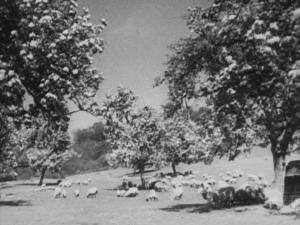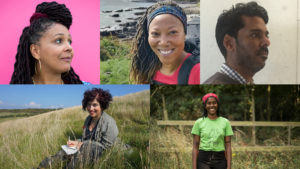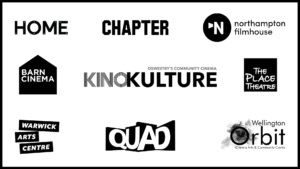



━━━━━━━━━━━━━━━━━━━━━━━━━━━━━━━━━━
To accompany the launch of our new touring programme Right of Way, which focusses on access and inclusion in the UK countryside, this Cinema of Ideas event will explore the myths and realities of the rural idyll, the histories, herstories and theirstories of countryside life and examine how different groups of people and individuals have always enjoyed and accessed the great outdoors in myriad and sometimes contested ways.
To discuss this and wider questions please join us and our panel Louisa Adjoa Parker, Alinah Azadeh, Sam Siva and Rhiane Fatinikun on Thursday 20 October at 6:30pm BST. The panel will be moderated by Jonathan Ali. After the live event, a recording of the discussion will be available to watch until Thursday 27 October.
Alongside this discussion we are delighted to be hosting the short non-fiction film Springtime in an English Village (1944), with a special introduction by Robin Baker, Head Curator at the BFI National Archive.
Finally, you can watch a filmed performance of sacred space – a new poem by Louisa Adjoa Parker, created in response to the Right of Way programme.
This event is free and available to view worldwide. Please consider donating to one of our partner cinemas when booking your ticket. Book here.

Streaming 13-27 October
This extraordinary and unexpected snapshot of rural life in wartime – unseen for years due to the fragility of the materials – documents the most ancient of English traditions: the selection and crowning of the Queen of the May. But what is perhaps surprising for the era is that almost 80 years ago the village of Stanion in Northamptonshire chose to honour a young black girl – apparently the daughter of an African merchant seaman who had been evacuated there during the War.
It’s hard to know quite how literally to take the proceedings. The film was made by the Colonial Film Unit for the purpose of screening throughout Britain’s African and Caribbean colonies – to demonstrate ‘typical’ life in the UK – at a time when the government needed to recruit the support of men and women from across the Empire. Later, in the immediate post-War period, such films not only aimed to reinforce imperial solidarity, but formed part of a propaganda campaign to attract cheap labour to the UK.
Presented with a special introduction by Robin Baker, Head Curator at the BFI National Archive.
About Robin Baker
Robin has worked in film exhibition, distribution, marketing and archiving for 30 years and was part of the team that established the Independent Cinema Office. He’s now head curator of the BFI National Archive where he works with the curatorial team who are responsible for developing, interpreting and presenting the national collection of film and television. He is currently particularly excited about the recently announced inaugural BFI Film on Film Festival that will take place in June 2023.

Louisa Adjoa Parker
Louisa Adjoa Parker is a writer and poet of English-Ghanaian heritage who lives in south west England. Her first poetry collections were published by Cinnamon Press, and her third, How to wear a skin, was published by Indigo Dreams. Her debut short story collection, Stay with me, was published in 2020 by Colenso Books. Her poetry pamphlet, She can still sing, was published by Flipped Eye in June 2021, and she has a coastal memoir forthcoming with Little Toller Books. Louisa has written extensively about ethnically diverse history and rural racism, and as well as writing, works as an Equality, Diversity and Inclusion consultant.
Alinah Azadeh
Alinah Azadeh is a British-Iranian writer, artist, performer and cultural activist. She is inaugural writer-in-residence at Seven Sisters Country Park & Sussex Heritage Coast, commissioned by South Downs National Park, leading We See You Now, a landscape and literature-focused arts project supported by Arts Council England. Working with a cohort of writers from global majority backgrounds, the project seeks to evoke the trans-global perspectives on this rapidly changing coastal landscape, through new speculative stories, life writing and poetry, across live, digital channels – and eventually, in print. As well as visual commissions and programme design for major museums, galleries and across diverse communities in the UK over the last 25 years, she has had short stories, poetry and academic journal articles published and is a contributor to Glimpse, the first Black British speculative fiction anthology published by Inscribe / Peepal Tree Press, edited by Leone Ross. She is completing her first book, In the Skin of a Stranger.
Sam Siva
Sam is a Black and Mixed (Black Jamaican, Sri Lankan) writer, grower and organiser with Land In Our Names (LION). They are interested in liberation through healing and building resilient communities and how access to land and nature are key to this. They are also passionate about building resilient and transformative systems, centring care and reparative justice in their work.
Rhiane Fatinikun
Rhiane is an outdoors advocate, with a passion for human empowerment and challenging the status quo. In January 2019 Rhiane founded Black Girls Hike, a charitable organisation and hiking group seeking to address the lack of representation and inclusion of people of colour in the outdoor community and to provide a safe environment for black women to enjoy the natural world. The group also run training days and skills weekends in leadership and teamwork, which also address the under representation of black instructors in the industry. Rhiane hopes to continue the growth of BGH across the UK, which currently has chapters in the North West, London and the Midlands, and to work with likeminded groups internationally. An additional 10 chapters are currently being set up across the UK.
Jonathan Ali
Jonathan Ali is a film programmer, curator, and writer. He began his career at the Trinidad and Tobago Film Festival (2006–2015), where, among other initiatives, he curated the first Caribbean retrospective of the work of John Akomfrah and Black Audio Film Collective. He became Director of Programming for Miami’s Third Horizon Film Festival in 2016, and in 2022 curated a retrospective of the work of French- Caribbean director Sarah Maldoror. Based in London, he is co-founder of The Twelve30 Collective, which screens Caribbean cinema in the UK. He is a programmer with Alchemy Film and Moving Image Festival, programme consultant for Open City Documentary Festival and Locarno Film Festival’s Open Doors programme, and was previously a programme consultant with Sheffield Doc/Fest. He is a peer reviewer for the BFI/Doc Society feature documentary fund, and a programmer for Getting Real, the International Documentary Association’s biennial industry conference.
Help support independent cinemas by selecting one of our partner venues at checkout.

Springtime in an English Village will be available with descriptive subtitles. The live conversation on Thursday 20 September will be live-captioned.
This event is available to view worldwide. A recording of the conversation will be available to view on the platform from 6:30pm BST on Thursday 20 October until 11:59pm BST on Thursday 27 October.
Panel discussion on who has the right to roam in the countryside + short archive film
Panel discussion, 6:30pm 20 October